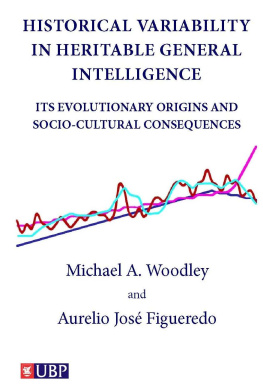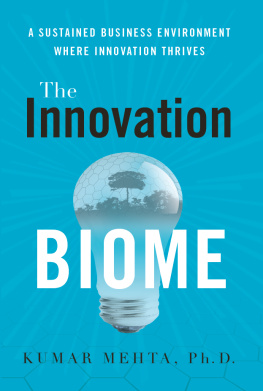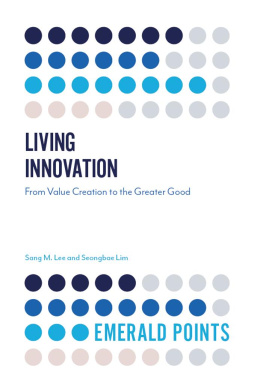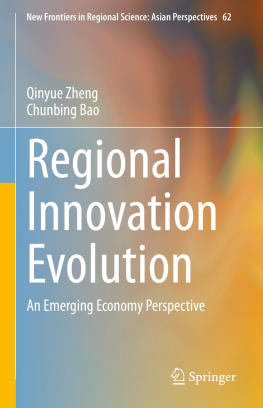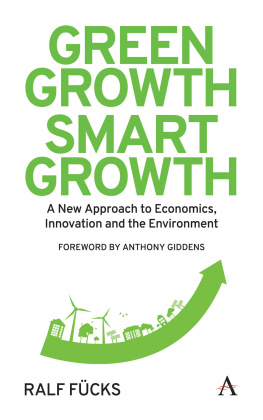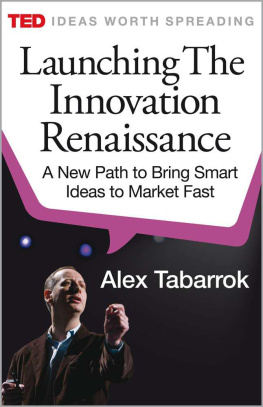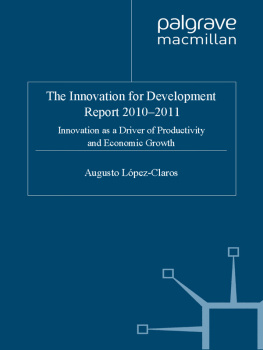Themoral right of the authors has been asserted.
All rights reserved. No part of this publication may bereproduced, stored or introduced into a retrieval system or transmitted in anyform or by any means without the prior permission of the publisher nor may becirculated in any form of binding or cover other than the one in which it ispublished and without a similar condition including this condition beingimposed on the subsequent purchaser.
MICHAEL WOODLEY is an individualdifferences researcher and behavior geneticist who holds a post-doctoralfellowship with Ume University and an honorary post-doctoral fellowship withthe Center Leo Apostel for Interdisciplinary Studies, Vrije UniversiteitBrussel. He lives in London, UK.
AURELIO JOS FIGUEREDO is an individual differences researcher and evolutionary psychologist,who has dual professorships with the University of Arizona in the departmentsof psychology and family studies and human development. He is also director ofthe universities ethology and evolutionary psychology graduate program. Helives in Tucson, Arizona.
Contents
Summary
Reconstructed changes in the meanlevels of the heritable component of general intelligence (shortened to g.h)trend in the same direction as the Western historical social status-fertilityrelation (i.e. positively up until the early to mid 1800s and then negativelyafter) and are strong predictors of changes in the per capita rates ofinnovation in science and technology (Woodley, 2012a). A prediction from 'smartfraction' theory is that this effect should be strongly mediated by changes inthe numbers of eminent individuals, i.e. those who actually generate innovation.This is tested using an index of fractionally scaled Western g.h means,along with data on per capita innovation rates (Huebner, 2005), per capitaeminent individuals (Murray, 2003) and also a measure of the fractionallyscaled change in the level of environmentally sensitive, narrow cognitiveabilities (shortened to s.e), which captures the Flynn effect. Intesting the theory we employed a combination of growth curve and hierarchicallynested path analysis in which serially autoregressive effects are considered.Consistent with smart fraction theory, the best fitting model reveals thateminent individuals mediate the impact of changing g.h on innovationrates (where g.hEminent individuals=0.915, andEminent individualsInnovation rates=0.427), in addition to g.hexhibiting a direct effect on innovation rates (g.hInnovationrates=0.495). Rising s.e by contrast has had no effect on the increaseand subsequent decrease in per capita rates of eminent individuals andsignificant innovations. This is consistent with the finding that dysgenicfertility is a Jensen effect in that it is significantly more pronounced onmore g-loaded subtests (Woodley & Meisenberg, in press), unlike theFlynn effect, which is significantly more pronounced on less g-loaded subtests(te Nijenhuis & van der Flier, in press), indicating that dysgenesis isprincipally associated with a decline in g.h and therefore the capacityfor significant innovation, whereas the Flynn effect is simultaneouslyassociated with secular gains predominantly in the s.e component. Thispresents a solution to Cattells paradox, or the contradiction presented by thesimultaneous observations of negative correlations between IQ and fertilitythroughout the 20th century and the Flynn effect. These findings are evaluatedin the context of a multilevel selection model, which proposes that innovationrepresents a eugenic group-selected altruistic behavior due to the lowindividual benefits documented for the innovators and the huge collectivebenefits documented for the group (Cattell, 1972; Clark, 2007; Figueredo, 2012;Hamilton, 2000). One prediction of this multilevel selection model connects individual-levelselection for increasing within-population mean g.h with group-levelexpansion facilitated via the application of innovations to the process ofconquest and colonization, which in turn offsets the individual-level selectionagainst those rare individuals possessing ultra-high IQs and othertraits predisposing towards the generation of significant innovation. Anotherprediction connects the process of rising within group g.h with periodsof heightened intergroup conflict facilitated by sources of ecologicalharshness. Conversely, reduced ecological harshness coupled with reducedinter-group conflict relaxes both individual and group-level selection forrising g.h, leading instead to individual-level selection for declining g.h.The dynamics of these evolutionary processes during the lasthalf-millennium are presented as supportive of this model.
1.Introduction
One of the most controversialfindings in intelligence research is the existence of negative correlationsbetween IQ and fertility. As long ago as the 19th century, it wasfeared that civilization had gone too far in alleviating the Darwinianpressures keeping those with valuable traits, such as high-intelligence, goodhealth and character in high-fertility, whilst supressing the same amongstthose endowed with low levels of these traits (e.g. Darwin, 1871; Galton,1869). This fear was manifest despite the absence of either sophisticatedpsychometric and anthropometric measures of these valuable traits orcompelling data indicating that their levels had actually changed. Early in the20th century, the term dysgenics was coined to describe thisphenomenon (Saleeby, 1913, 1914; Starr-Jordan, 1915).
Dysgenics was frequently definedin normative terms, with negative changes in the level of traits such as IQbeing described as socially undesirable. The term itself literally meansbad-breeding. The no less normatively loaded antonym of dysgenics, eugenics(meaning good-breeding) was coined even earlier (Galton, 1883). The idea was touse eugenic measures to counter the socially undesirable consequences ofdysgenic fertility.
When attemptinga scientific discussion of issues such as dysgenics and eugenics, we believethat it is very important to define the relevant terms with greater precisionthan is typically done, as this field of research isfraught with many misunderstandings. In doing so, however, we will of necessitybe making certain interpretations regarding the way that some of the morepolitically-charged terms have been used historically, and we will be providingevidence for those interpretations.
The first term of art that needs clarification is fitness,as opposed to selection. Selection is a process and fitnessis the outcome of that process. Fitness is defined in population biology asgene-copying success under a particular regime of selection, although it issometimes used colloquially as the heritable phenotypic traits that confer suchan advantage. As a consequence of the many misunderstandings of the word fitness,we limit our use of that term in this monograph exclusively to instances wherefitness is explicitly invoked as an outcome, and retain selection for wherewe describe the differentials in survival and reproduction produced bydifferent selective processes, or

